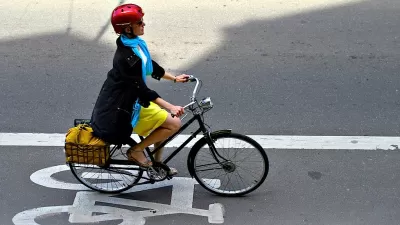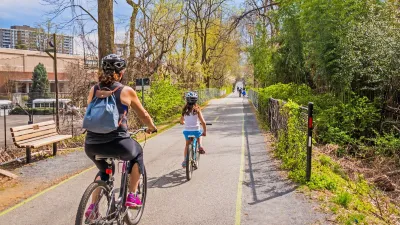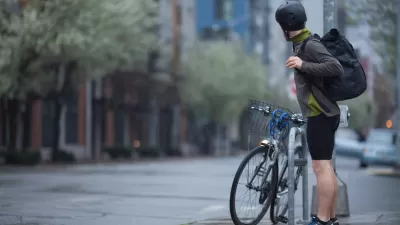Rep. Albert Sires (D-N.J.) introduced the New Opportunities for Bicycle and Pedestrian Infrastructure Financing Act of 2014 (H.R. 3978), modeled on TIFIA, to promote investment in bike and pedestrian facilities to make streets safer for all modes.

Congressman Albio Sires, a member of the House Transportation and Infrastructure Committee, introduced H.R. 3978, a credit assistance pilot program on Jan. 29 after participating in a hearing the previous day of the "Improving the Effectiveness of the Federal Surface Transportation Safety Grant Programs". Sires asked witnesses at the hearing "how the federal government can make our roads safer for all users," writes Denise Copeland of N.J. com's off-road bike blog.
"More than 30,000 people were killed in motor vehicle crashes in 2012, and 17% of those deaths were our roads most vulnerable users: pedestrians and bicyclists. Yet, only 1.5% of federal transportation funding goes towards making our sidewalks and streets safer for them," said Sires in his press release on the hearing.
His bill is modeled on the successful and bipartisan Transportation Infrastructure Finance and Innovation Act (TIFIA) program that "provides Federal credit assistance in the form of direct loans, loan guarantees, and standby lines of credit to finance surface transportation projects of national and regional significance" (according to its Federal Highway Administration webpage).
The New Opportunities for Bicycle and Pedestrian Infrastructure Financing Act of 2014 (NOBPIFA) will allow communities to take advantage of low-cost financing for projects that make streets and sidewalks safer for all users through a new federal credit assistance program that would direct millions specifically for low-income communities.
Sires referenced the report, "The New Majority: Pedaling Towards Equity”, published by League of American Bicyclists and the Sierra Club last May in his press release for H.R. 3978.
While the report highlights strong growth in bicycle ridership across America’s communities, it also raises concerns about the significant challenges faced by many underserved communities. To that point, in 2001 the fatality rate was 23% higher for Hispanic and 30% higher for African-Americans when compared to white riders. This legislation would require that 25% of project funding benefit underserved communities, with the goal of creating a more equitable, safe roadway environment for all Americans.
Should the bill become law, one challenge it will have will be to shorten its acronym, NOBPIFA, to make it easier to pronounce.
FULL STORY: Show your support for for the new Bicycle and Pedestrian Infrastructure Financing Act

Planetizen Federal Action Tracker
A weekly monitor of how Trump’s orders and actions are impacting planners and planning in America.

Maui's Vacation Rental Debate Turns Ugly
Verbal attacks, misinformation campaigns and fistfights plague a high-stakes debate to convert thousands of vacation rentals into long-term housing.

San Francisco Suspends Traffic Calming Amidst Record Deaths
Citing “a challenging fiscal landscape,” the city will cease the program on the heels of 42 traffic deaths, including 24 pedestrians.

Amtrak Rolls Out New Orleans to Alabama “Mardi Gras” Train
The new service will operate morning and evening departures between Mobile and New Orleans.

The Subversive Car-Free Guide to Trump's Great American Road Trip
Car-free ways to access Chicagoland’s best tourist attractions.

San Antonio and Austin are Fusing Into one Massive Megaregion
The region spanning the two central Texas cities is growing fast, posing challenges for local infrastructure and water supplies.
Urban Design for Planners 1: Software Tools
This six-course series explores essential urban design concepts using open source software and equips planners with the tools they need to participate fully in the urban design process.
Planning for Universal Design
Learn the tools for implementing Universal Design in planning regulations.
Heyer Gruel & Associates PA
JM Goldson LLC
Custer County Colorado
City of Camden Redevelopment Agency
City of Astoria
Transportation Research & Education Center (TREC) at Portland State University
Jefferson Parish Government
Camden Redevelopment Agency
City of Claremont





























